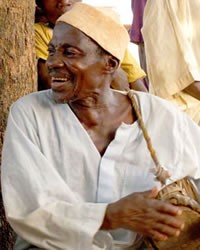Nandu-Tari, Ahwai in Nigeria

Photo Source:
Anonymous
|
Send Joshua Project a map of this people group.
|
| People Name: | Nandu-Tari, Ahwai |
| Country: | Nigeria |
| 10/40 Window: | Yes |
| Population: | 13,000 |
| World Population: | 13,000 |
| Primary Language: | Ahwai |
| Primary Religion: | Christianity |
| Christian Adherents: | 55.00 % |
| Evangelicals: | 7.00 % |
| Scripture: | Translation Started |
| Ministry Resources: | No |
| Jesus Film: | No |
| Audio Recordings: | Yes |
| People Cluster: | Benue |
| Affinity Bloc: | Sub-Saharan Peoples |
| Progress Level: |
|
Introduction / History
The Ahwai live in the southeastern corner of Kaduna State, Nigeria around the mountain upon which their ancestors lived in the first half of the 20th century. They are made up of three sub-groups (Anyeng, Andung and Sakara) who all speak the same language, Ahwai, which means 'brother'. The Ahwai are subsistence farmers, raising livestock and crops such as corn, yams, okra, groundnuts and various kinds of greens.
They live in mud-brick houses with tin or thatched grass roofs. Usually, the Ahwai marry within their own sub-group, and intermarriage within the whole Ahwai group is also common, which bodes well for the vitality of their culture and language. There are primary and secondary schools in the Ahwai villages, but no Ahwai textbooks. Education in the early grades is in Hausa, while older students are instructed in English.
With regard to religion, Christianity is predominant. Evangelical Reformed Church of Christ missionaries from South Africa brought Christianity to the area in the 1920s. Since then, the number of churches of different denominations has grown significantly. Although the majority of Ahwai are Christians, these people do not have God's Word in their heart language. When asked why the Bible in Ahwai is needed, the answer given is almost always the same: "So people can understand more deeply, be touched, and grow spiritually."
One pastor expressed his opinion that the translation would also be really useful for native clergy, so their preaching would spring from real, meaningful understanding. Although the Sunday services are usually held in Hausa, the local pastors realize that Hausa isn't enough to build a sufficient understanding of the Scriptures. Many of them are not Ahwai themselves, but they see it is important that the people receive the Scriptures in their language for their own personal spiritual growth and for their life changing impact.